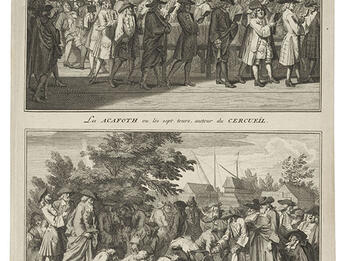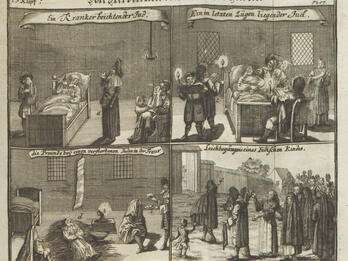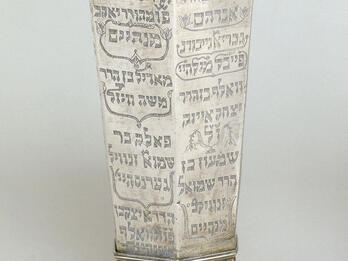Sefer ha-tsava’ah (Book of the Testament): Rituals on Dying and Mourning
My beloved wife Esther Sheindel, may you live long, since we, on account of our affection, once made a pact, as it were, that if one of us dies, the other should implore God’s mercy for the other to die as well, in such manner that we depart this world at the same time; but now, upon reflection, I regret this, for why should we concern ourselves with the hidden mysteries of the All-Merciful [see b. Berakhot 10a]? And for sure, if we should live out our full allotted lifespans, that is also a divine decree, what a wonderful and acceptable thing it will be—and one should not cause injury to oneself, especially if we do not, God forbid, live out our full lifespans. Therefore, I hereby release you from your obligation—and may you live to the age of a hundred and twenty, and perform mitzvot and good deeds all the days of your life; and I hereby nullify the entire matter of our arrangement, as though it had never taken place—and you too should do likewise if, God forbid, the divine decree is to the opposite effect [i.e., you are the one to die first]. But may the Almighty do what is good in His sight!
I am asking of you, my beloved, my dove, my perfect one (Song of Songs 5:2), that you should not remarry, that no man should ever touch your body again, though I indeed have no need to request this secret [see Daniel 2:18], due to your piety—for you are designated for the world to come, and may I partake of your spiritual portion and share in your lot!—and also because you are too old to remarry. Nevertheless, I have been speaking to you until now on account of our special affection—and I shall pray for you that you may live.
My beloved, my darling, just as you were as you grew up with me [see Esther 2:20] in this life, so should you respect me with genuine lovingkindness after my death [see Genesis 47:27] and forgive me for the offense of my failure to fulfill my obligation toward you in regard to the payment of your marriage contract, after all the favors that you have bestowed on me during my lifetime, and what your father, my illustrious father-in-law of blessed memory did. I have no wish to repay good with evil, but one may not judge based on what is possible in a case where it is impossible, for I simply do not possess the wherewithal to make the repayment. Therefore, please have pity, please forgive, please forbear, so that I shall not be regarded as a wicked borrower, who does not repay (Psalms 37:21) his debts and that I may have rest in the world to come, and that violence does not rise up into a rod to strike me and I be called an evil man, heaven forbid [see Ezekiel 7:11]. However, I am confident in your uprightness that you will act even in advance of my explicit request in this regard, and remit the outstanding balance.
And now, all that I leave behind me—whether silver, gold, jewelry, moveable items, household utensils of tin and copper, and other utensils of any kind that one can mention and imagine—they are all ultimately yours in perpetuity. My sons, may they enjoy long lives, are to have no connection whatsoever with them, of anything which one can mention and imagine, not even as much as a farthing’s worth. Nor should they take accounts, for I have acted with integrity in relation to all these matters, and neither they collectively nor even one of them alone should have, against you, any claim whatsoever to demand an oath, a superimposed oath, the acceptance of a judicial ban, or even a gripe based solely upon moral considerations. And even taking all this into account, in the event of my yet becoming infinitely wealthy before my death (for is the hand of the Almighty limited in power?) [see Numbers 11:23], notwithstanding that eventuality, everything is to be yours in whatever way that will ensure your maximum benefit in accordance with the enactments of our sages of blessed memory. You shall have the legal advantage, and for your entire life, it all shall belong to you; and whatever blessing you may leave behind you shall belong to my beloved and pleasant sons, may their Rock and Redeemer keep them safe. I am confident in them that they will not harbor resentment against me or against you, for they are all equally upright and pious, all equally worthy of goodness and blessing.
My beloved, my close companion, should you wish to dwell with one of your sons in your old age, then choose with care a place where you are certain that neither your son nor your daughter-in-law will encroach upon your dignity. On the contrary, they should accord you great honor, to the same extent that you were accorded by me during my lifetime. In my view, the most suitable of our sons is R. Isaac Katz, as he is the eldest, and for other reasons. Nonetheless, I am inclined to set up an independent abode for you, so as to prevent the children stumbling into sin on your account.
My beloved wife, flesh of my flesh, you should go to my grave on the day preceding each new moon, if the Almighty will accord me the merit of being buried in the area where you live. You should go on the day before each new moon to pray for me, for my soul, for me and for yourself; and whatever will be possible for me to do for you too—to pray on your behalf before His glorious throne, I shall do.
My beloved other half, I ask of you to take the utmost care that all the words of this will and testament are fully implemented, from the time that I become ill for a period of twelve months; and my merit shall be dependent upon you.
From the first portion of the money of the large debt due to me from the province of Wahlen, there should be deducted, through the medium of a gathering of distinguished authorities, the sum of two thousand gold pieces for the poor of the land of Israel; and that will have the same legal effect as if it were already collected by, and in the control of, the senior charity collectors for the poor of the land of Israel. And I further decree by way of an interdict on the province [Wahlen] that they should not defer such payment even by one hour; and should they delay, I shall seek justice against them in the world to come; but I have confidence in the Assembly of the Almighty that they will exert themselves to this pay forthwith.
They shall also donate, from this debt [due to me], the sum of two hundred gold pieces to the holy fraternity, the burial society of the holy community of Ostraga, and the sum of two hundred gold pieces to the burial society of the holy community of Stefan. That is to say, that the communities, may their Rock and Redeemer keep them safe, shall give this amount to the societies, and they shall set it off against the amount due to the state as the royal tax; and the aforementioned burial societies shall purchase (from this) some valuable appurtenance for the synagogue as shall seem appropriate to them, and let it be inscribed with their name. Only let me be remembered for the good, as I was the charity collector for the aforementioned burial societies for several years; and that shall be my memorial.
Credits
Naftali ha-Kohen Katz, “Sefer ha-tsava’ah (Book of the Testament): Rituals on Dying and Mourning” (manuscript, Russian Empire, ca. 1718). Published as: Naphtali ben Isaac ha-Kohen, Sefer ha-tsava’ah (Mukacheve, Ukraine: Ozer HaCohen Faryad, 1904), pp. 23–25.
Published in: The Posen Library of Jewish Culture and Civilization, vol. 5.





